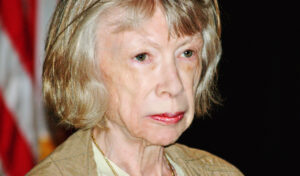
Photo of Didion in 2008 by David Shankbone, courtesy Wikimedia Commons
Didion has died. She was the last of American peers (save Gay Talese, who is 89) dubbed New Journalists, and the only woman widely acknowledged to be in the group. The label meant, at least in part, to have become popular as a writer in the 1960s, to have been defined by that decade, to have helped define it, and to be more personal in the prose than purely journalistic, critical, or academic. Mailer, Capote, Wolfe, Plimpton, Terry Southern, Jimmy Breslin, and Hunter Thompson have at least temporarily faded or even disappeared, but Didion has not, and I do not think that is entirely about outliving them. There are things from the ‘60s that just hit and stuck: the Beatles, the paranoid myths of Kennedy and Manson, the self-destructive Left, the Nixonian Right. In reading Didion, in that time, we continue to hear meaning about ours.
Lumping so-called New Journalist personalities together was always a strange construction, given how different their styles could be. Didion’s was the most elegant and, not coincidentally, often seemingly the plainest on the page. The Times obituary re-quotes someone calling her hysterical, which is wrong, at least for her nonfiction. As one scholar said of Hemingway, she was exquisitely sensitive, and she often wrote what another scholar called Hemingway’s short fiction: “nightmares at noonday,” quiet, hellish little scenes that were often domestic. (Her profile of a hippie apartment in The Haight, with its little girl tripping on acid, is one such piece.)
Didion rarely got surreal, lyrical, or fortissimo to make her point. She was the inheritor of Eliot’s brand of Modernism, which believed in the objective correlative. She was heavily influenced by Hemingway and Conrad (and loved John Wayne), all those old guys, and this always made her a bit of a problem for what is now called the intersectional. One female editor I know said she is a bitch for her near-toxicity.
The tendency to see others behaving badly wherever one looks, and to take them down in the writing, is the basis for another charge in the Times: cynicism. I do not see it that way. Didion had the gift of seeing, of finding stories or images anywhere she went. On top of that, she could make judgements that did not decay quickly. I would call her Chekhovian, another worn-out, old-school comparison, and would put her in my own grouping with nonfiction writers such as Orwell, cummings, Martha Gellhorn, and Zbigniew Herbert, whose nonfiction prose holds up.
What Didion most definitely was not was a cog in the social-media Irreality Industry, where everyone is brave and kind and fierce and mutually-supporting and woke, unless they are angry and tactless and simplistic and unconvincing and banal. One measure for me of her greatness is that I can pick up one of her nonfiction books, whatever my mood, and instantly drop in that groove and hear lines that are true. Her nonfiction prose is one answer to the difficult reality it portrays. Often, the shorter it is, the better, as in South and West, because it distills her tendencies to prose poetry.
Didion told Hilton Als, in an interview in the Paris Review in 2006, “[Naipaul’s] nonfiction had the same effect on me as reading Elizabeth Hardwick—you get the sense that it’s possible simply to go through life noticing things and writing them down and that this is OK, it’s worth doing. That the seemingly insignificant things that most of us spend our days noticing are really significant, have meaning, and tell us something.” It was her gift, and ours.
